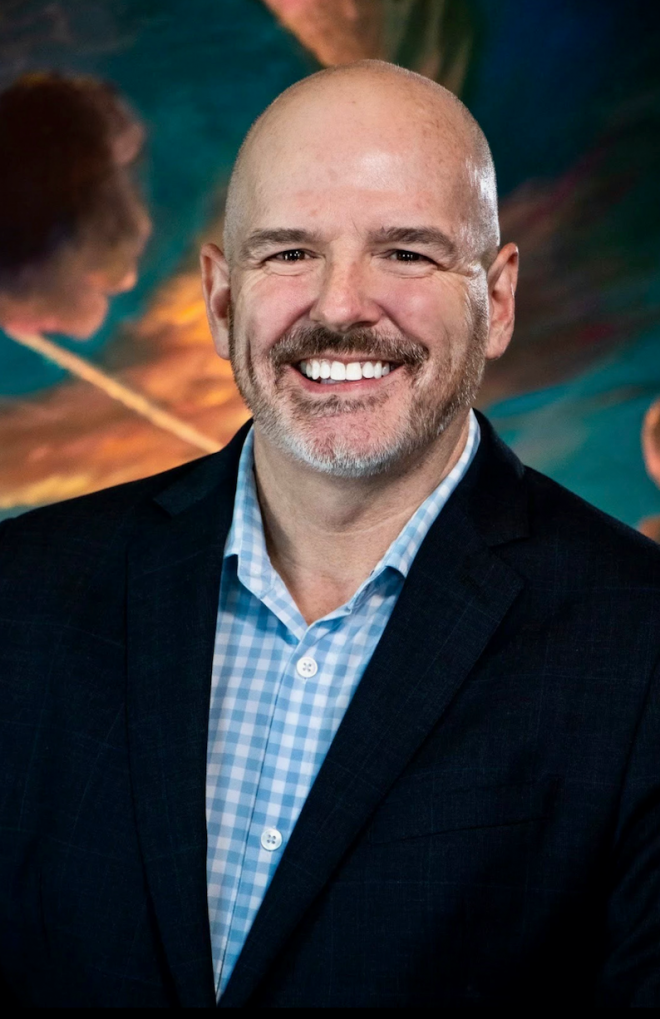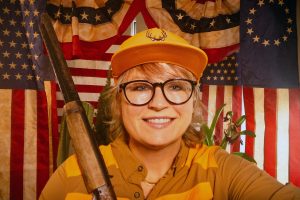THE TRIPLE THREAT

When Greg Nabholz isn’t working in real estate, he finds the time for films as an investor and actor.
INTERVIEW / KODY FORD
Greg Nabholz has played a vital role in community development and growing the arts in central Arkansas. He and a group of associates guided the revitalization of downtown North Little Rock as it transformed into the Argenta Arts District. His talents for placemaking have found him working on projects on the local, state and federal levels. A University of Arkansas graduate, Nabholz has long been a lover of film. He serves on the board of directors for the Arkansas Cinema Society and the Argenta Theatre—the stage being his other love along with the Hogs. He has invested in several independent films and recruited other investors to support Arkansas filmmaking. We chatted with Nabholz about what made him take the plunge into the world of filmmaking.
The first film that you invested in was All the Birds Have Flown South, directed by the Miller Brothers and starring Arkansas’s own Joey Lauren Adams. What was it that made you want to come on board?
Well, all of my investments in [movies], and primarily these films that are made in Arkansas—All the Birds, as well as Antiquities—is my desire and want to see the film industry in our state grow. And I felt like these people that were involved in both of these films were amazing creative people that have honed their skills here in the state. And I want to be a part of that, be a part of not only the projects themselves, but also looking at how we can parlay that into growing the film industry here. And so those were my motivations.
Did the Millers approach you early in the process or kind of later in the pre-production process?
Yeah, I was approached fairly early. They were in this phase of seeking out investors and had a couple of gatherings to promote the idea of investing and so I was approached by them. And then at that point too, I had other friends that I was able to bring on [as investors]…So, they were very obviously appreciative of that. It was a fun project.
What was it that sold you on it?
What attracted me is that I’d been going to the Little Rock Film Festival since its inception and always loved a lot of the work that the Miller Brothers had done. And knowing that this was their baby and they were really wanting to do this feature length… It was a dark, dark movie, but at the same time, very beautifully made, not only written, but the cinematography and everything about it. You could basically feel that it was very raw, but it was something that I liked the idea of—being a part of a project…on that side of it. Instead of just being a person that just goes to appreciate film at a film festival, you actually got something that is being shown in different places and you say, ‘Hey, you know, I played a role in that. A small role, but nonetheless a role.’ It was also fun to be able to go to all the locations. We’re invited every day to go on set and watch behind the scenes, and that was definitely a motivation as well. It’s just being able to be behind the scenes, and see all the intricacies that go into it.
Were your other friends like-minded and jumped at the opportunity or did you have to make a harder sell to get them on board as investors?
Well, it was really easy because it would be a very social setting and of course, all you have to do is give them a few drinks. [laughs] Next thing you know, they’re signing on the dotted line. But no, these were people that actually lived in the building with them or at least knew the Miller brothers just from being at Dugan’s Pub hanging out. And it was just like, ‘Hey, I just wanted you to know, I just invested in this movie. This is kind of a cool opportunity to be a part of the same thing.’ And they liked that idea too. It was just something unique. It was one of those deals like—it wasn’t like they were having to make a return on it—obviously, you want to make a return, but the idea was, this sounded like a good thing to do, but also kind of a fun thing to do. If you looked at it just as a donation or contribution—like how some people do in these smaller projects—it’s a lot different than just writing a check. And that’s the end of it. You’re actually involved in the whole process, their creative process. And I think that really appealed to [other investors] so it was not a hard sell.
We just had the new tax credits that came into effect in Arkansas. What would it take to get more people willing to open their checkbooks here in the state to invest?
Obviously, the incentives and everything are going to be a huge, huge part of it. I think that the big thing is getting attractive projects where you really do have a very defined post-production and defined marketing of where this film is going to go. Whether you’re being picked up by a streaming service and that’s going to be the endgame, or you’re going to go the festival route and then hope to get it sold that way or that you’re going to go straight to being released to theaters. That’s going to be obviously the key is…there is a clearly defined path. And the more you’re getting your upfront costs reduced by these incentives that the state could provide on the front end is just gonna make the chances of that endgame much greater.
You recently served as an executive producer on your nephew Strack Azar’s feature film debut, which was based on a short that he had done. Now, not only were you an investor, but you also got some screen time as well.
The name of the movie is called The Banality and I play a country doctor. It is about this couple who lives in this rural area in Mississippi. They live outside of town and this kid—who’s a feral kid, who’s just been out in the wilderness—happens upon their house. Through the community and everything, they adopt him. But it’s a dark kind of movie, but there’s a lot of twists and turns in it. There’s some kind of surrealness to it and some magical elements. But it deals with a lot of different people and their lives and the demons that they’re having to deal with and does not end well. So, I’m excited about seeing it when it is completely done. He threatened to cut one of my lines out and I said, ‘We better put some more back in there because I gotta get my SAG card.’ [laughs]
You also were an investor in A Very Sordid Wedding by Del Shores, the sequel to his film and TV series Sordid Lives. Tell us a little bit about that film and your involvement.
So again, it was just strictly a small investment. The sequel was was 15 years [since] Sordid Lives and it was basically one of the lead characters right after the Supreme Court legalized gay marriage. And it was centered around he and his husband, who is black. And so you’ve got these two things coming back to a small Texas town—a gay marriage and an interracial couple—and so all the nuances that you can imagine go with that and being done with humor, but also with a lot of heart. And that the intent of this film was to open up people’s eyes that love is love. And it just shows how even in a small town like Winters, Texas—you’ve got bigots everywhere—but most people in these towns are good folks and they can adapt. It may be slower than some other areas, but they do adapt and pivot.
Oftentimes creatives speak creative, they don’t speak like a business person. What would be some things you think filmmakers should do before they approach potential investors?
Well, I think first of all, you have a solid business plan with a clear and direct path for how that movie is going to be marketed as far as what direction you’re going to go. I think you need to have some of these agreements already in place, which a lot of times, these people they’ll have at least the connections and you need to have some lead investors on board. You know, obviously getting a key person that’s maybe a well-known name to be part of the project is going to help, but you’ve got to have that solid business plan. And that’s just one thing I’ve seen. I gave my nephew a lot of advice based on my other investments, because he’s definitely a phenomenal creative, but the business side of it’s just something that—you know, he’s young, so that’s going to come along. But I said, ‘You need to have all this,’ telling him all these steps that he needs to have because people—a lot of it’s family members and different people like that—it’s still people that are putting money into something. You want to be the best stewards of somebody’s investment, regardless if they’re relying on it being a return or not, you’ve got to be a good steward. And so that solid business plan to me is so crucial.
You convinced some of them to come on board films like All the Birds and invest, but there’s a lot of other people here in the state who have the financial means but they’re not investing in films. So what would your pitch to them be as to why they should invest in Arkansas film?
Well, I think if nothing else, I’d say, ‘Hey, here you invest in stocks and maybe real estate and, and other types of investments, why not just diversify a little bit and put some money into a project that is so different than anything else you’ve got that could on one hand? It may not make you anything but a write-off, but on the other hand, it could be one of these things that just takes off and becomes a hit. Next thing you know, you’re making a huge return. Filmmaking is a risky investment, but why not put some of your disposable income that you have available to do some investments and then be able to get involved with the process, which is a lot of fun and just something different.
Photo courtesy of Greg Nabholz





Comments